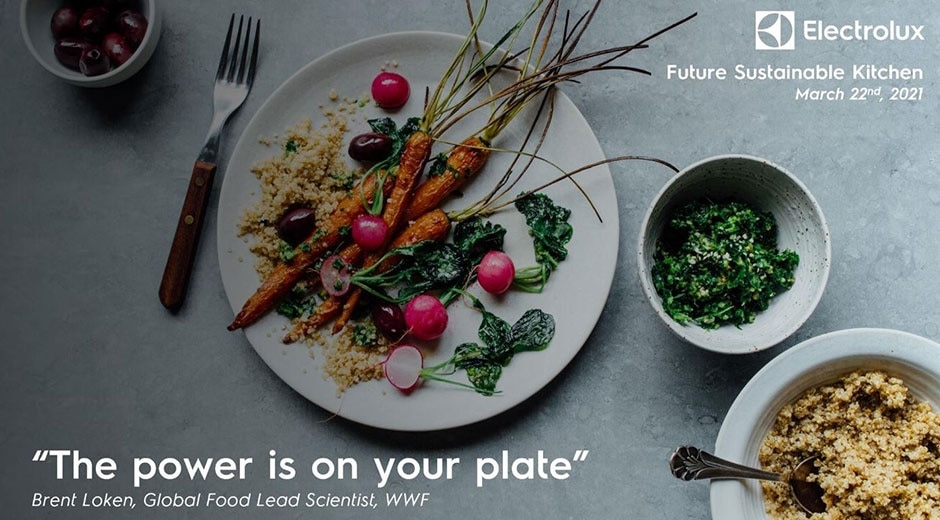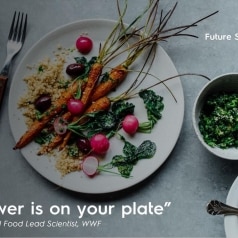If the food sector does nothing to combat climate change, food emissions alone will threaten the Paris Agreement and the chance to achieve the 1.5 to 2.0 degree climate change targets, warns WWF Global Food Lead Scientist Brent Loken.
Loken was speaking at Electrolux-hosted event Future Sustainable Kitchen which took place online this week, bringing together experts from across the food ecosystem to discuss how we can all work together to make sustainable eating the preferred choice.
“We have to make sure we do not become numb to this crisis we are facing. We have to start realizing we have one planet – a single planet – and we are exceeding environmental limits the earth is placing upon us”, said Loken.
The food industry is currently responsible for 22%* of greenhouse gas emissions, 69%** of freshwater withdrawals, as well as a loss of biodiversity and tropical deforestation. On top of that, obesity affects one in three people and is the leading cause of death worldwide – yet 690 million people don’t have enough food today. ***
“The power is on your plate”, explained Loken. In other words, making changes towards a plant-based diet will have a huge impact on both the planet and health. Even a meat-free day a week can make a difference.
So why aren’t consumers making better, more sustainable choices? Event speakers all agreed that consumers see plant-based meals as more difficult to create and less tasty compared to meat options. Alison Mountford, Founder of Ends & Stems which offers a meal planning service to save time and reduce waste, argued that the greatest barrier to change is time, with people “spread too thin and too tired” to adopt sustainable eating at home.
Meanwhile, the impact food has on the environment is also seen as a confusing concept for consumers. Head of Sustainability and Quality Coop (Sweden) Charlotta Szczepanowski said that sustainability is not a “black and white issue” and consumers need better educating about their food purchases – pointing out for example that it is the production of food rather than the transportation of food that most heavily impacts the climate footprint.
Electrolux has a bold target to make sustainable eating the preferred choice by 2030 and Vanessa Butani, Head of Sustainability BA Europe said in order to achieve this people need nudging to make dietary changes. “It’s time to challenge perception to show people it’s not as hard as you think to cook and eat sustainably.”
So how can design nudge users to be more sustainable?
Good design is one that impacts consumer behavior, said Design Director for global design and innovation agency Ideo, Rachel Maloney.
“For designers, it’s about understanding what are the key moments (in the consumer experience) we can dive into to make change”, explained Maloney urging designers to think how they can be change-makers beyond a product to connect people back to food.
Renowned kitchen designer Johnny Grey talked about the importance of creating an ‘emotionally durable’ kitchen to encourage more sustainable behavior. “We can’t just talk about sustainable materials or less energy – we have to be aspirational. We have to trigger pleasure and belonging” – pointing out that elements such as acoustics, views onto nature, natural materials, fresh food on display and a place to socialize are all important to that feeling.
Watch this space for more highlights from the Future Sustainable Kitchen, coming soon.
About the Future Sustainable Kitchen
The Future Sustainable Kitchen took place on 22 March, bringing together experts from across the food ecosystem including kitchen specialists, grocers, food tech start-ups, NGOs and chefs to discuss how we can all work together to make sustainable eating the preferred choice. More details about the event can be found here.
Making sustainable eating the preferred choice by 2030
Making sustainable eating the preferred choice by 2030 is one of the areas we are working on as part of our For the Better 2030 sustainability framework. It’s also one of the four Better Living Program website here.
Sources:
* https://www.un.org/sustainabledevelopment/sustainable-consumption-production/
** https://www.un.org/sustainabledevelopment/sustainable-consumption-production/



